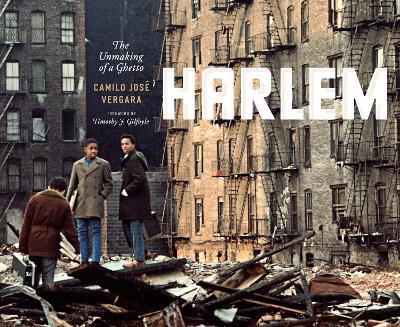Historical Studies of Urban America (CHUP)
1 total work
For more than a century, Harlem has been the epicenter of black America, the celebrated heart of African American life and culture - but it has also been a byword for the problems that have long plagued inner-city neighborhoods: poverty, crime, violence, disinvestment, and decay. Photographer Camilo Jose Vergara has been chronicling the neighborhood for forty-three years, and Harlem: The Unmaking of a Ghetto is an unprecedented record of urban change. Vergara began his documentation of Harlem in the tradition of such masters as Helen Levitt and Aaron Siskind, and he later turned his focus on the neighborhood's urban fabric, both the buildings that compose it and the life and culture embedded in them. By repeatedly returning to the same locations over the course of decades, Vergara is able to show us a community that is constantly changing - some areas declining, as longtime businesses give way to empty storefronts, graffiti, and garbage, while other areas gentrify, with corporate chain stores coming in to compete with the mom-and-pop shops.
He also captures the ever-present street life of this densely populated neighborhood, from stoop gatherings to graffiti murals memorializing dead rappers to impersonators honoring Michael Jackson in front of the Apollo, as well as the growth of tourism and racial integration. Woven throughout the images is Vergara's own account of his project and his experience of living and working in Harlem. Taken together, his unforgettable words and images tell the stories of how Harlem and its residents navigated the segregation, dereliction, and slow recovery of the closing years of the twentieth century and the boom and racial integration of the twenty-first. A deeply personal investigation, Harlem will take its place with the best portrayals of urban life.
He also captures the ever-present street life of this densely populated neighborhood, from stoop gatherings to graffiti murals memorializing dead rappers to impersonators honoring Michael Jackson in front of the Apollo, as well as the growth of tourism and racial integration. Woven throughout the images is Vergara's own account of his project and his experience of living and working in Harlem. Taken together, his unforgettable words and images tell the stories of how Harlem and its residents navigated the segregation, dereliction, and slow recovery of the closing years of the twentieth century and the boom and racial integration of the twenty-first. A deeply personal investigation, Harlem will take its place with the best portrayals of urban life.
